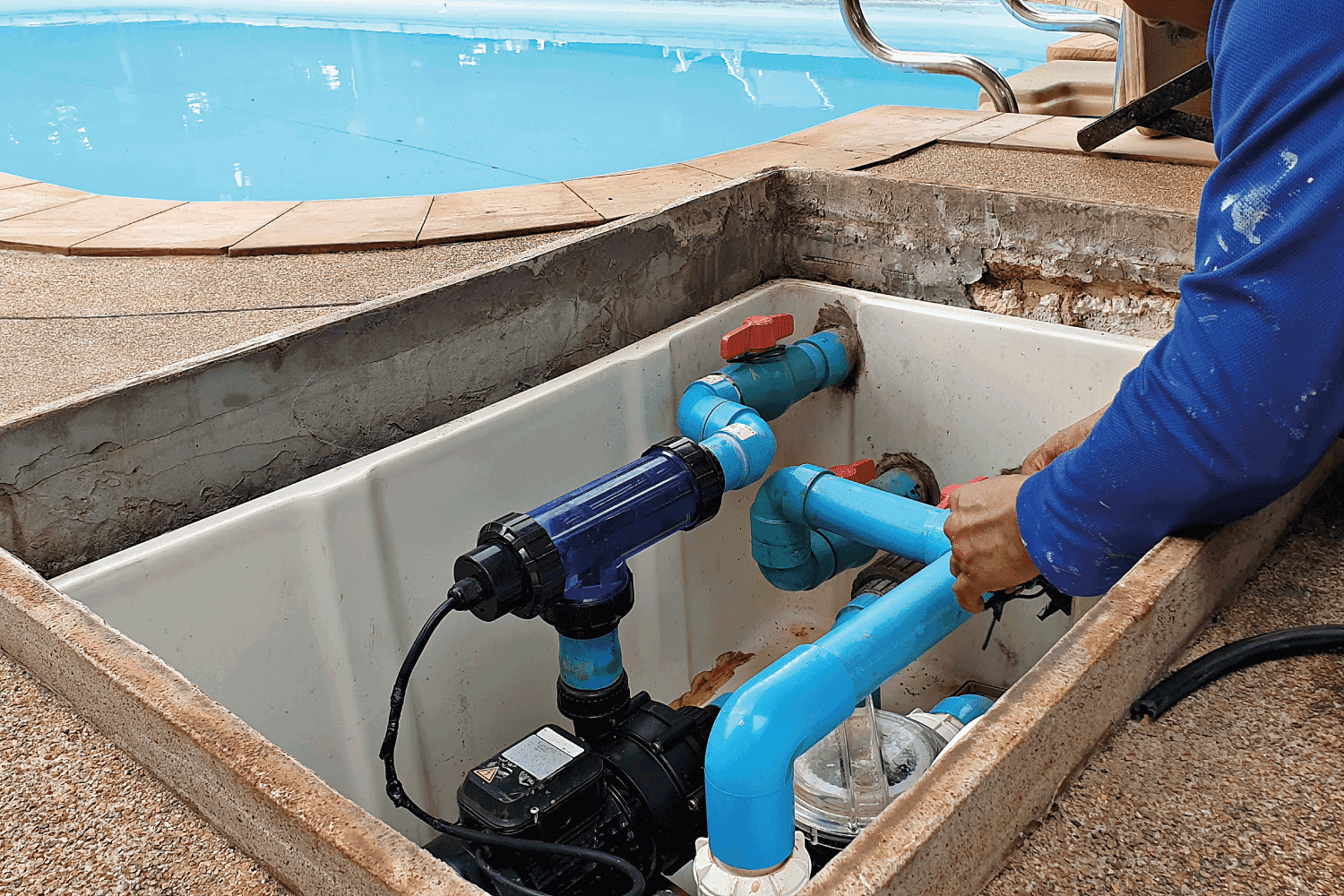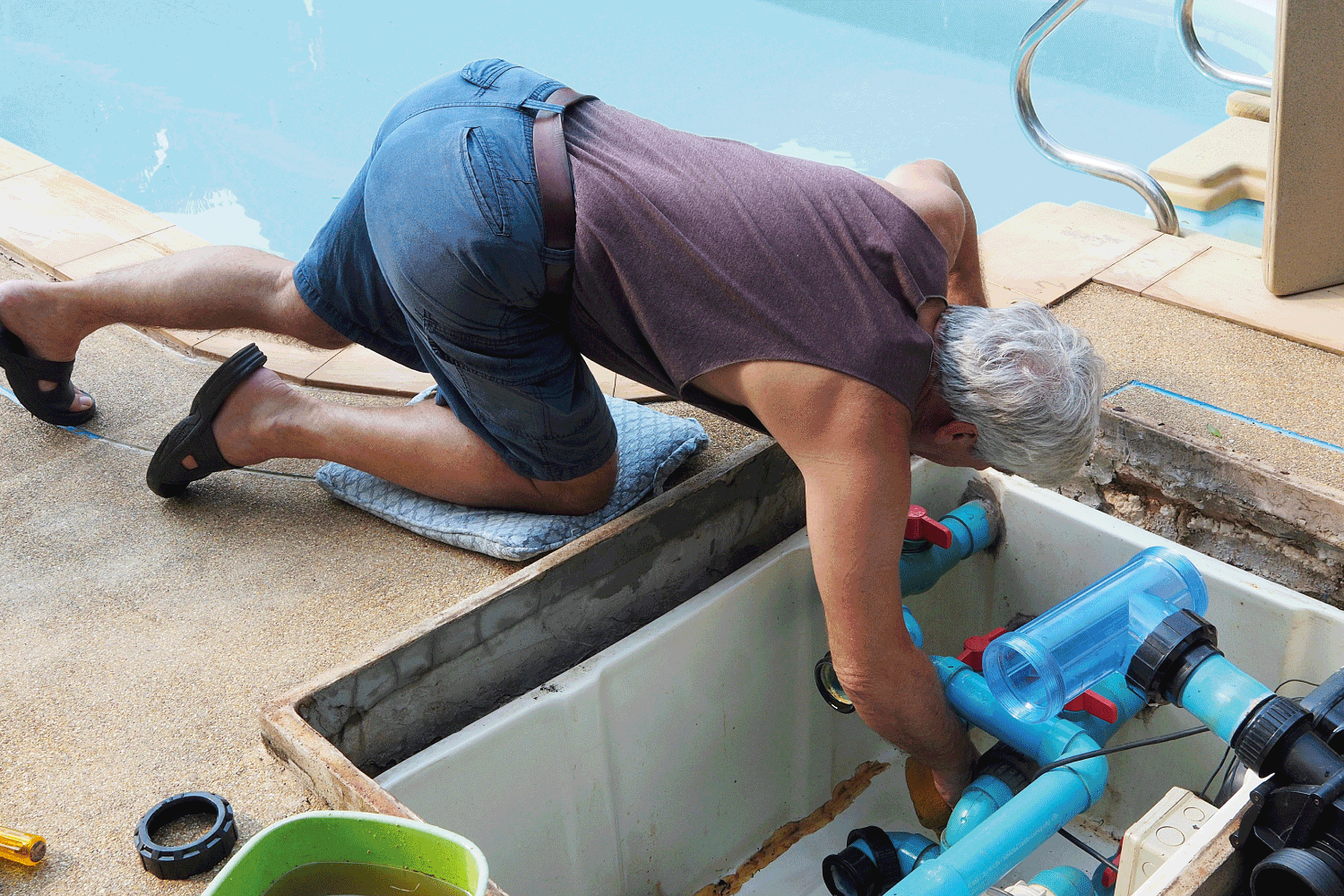If your pool heater is leaking, it may raise some concerns. However, what could be wrong with it for it to leak? Let's take a look at the possible culprits below.
If your pool heater is leaking from the side, it could be due to the following:
- Chemical damage
- Sanitizer damage
- Damaged heat exchanger
- Broken gasket
- Worn O-ring
- Damaged Internal bypass
- Condensation leakage
- Crack in pool heater
- Cracked headers
As you can see, there are several reasons why your pool heater is leaking from the side. In this article, we will take a closer look at these possible causes. In addition, we will answer other frequently asked questions about pool heaters, so read on!

Pool Heater Leaking From Side - What's Wrong?
A pool heater is used to heat water in a swimming pool. It can be either gas or electric powered, and it works by taking water from the pool, transferring it to a heated tank, and then putting it back into the pool. This heated water can then be used to keep the pool at a comfortable temperature, even during cold weather.
A swimming pool heater is an essential item for any household with a pool, as it allows you to extend your swimming season by several months, which means you will have more time to take advantage of your pool.
Pool heaters are fairly reliable devices, but they require some maintenance every once in a while, including an annual inspection by a qualified pool technician. In addition, parts can break, which can cause your pool heater to leak from the side.
Let's take a look at the possible reasons as to why this is happening:

Chemical damage
Chemical damage is a common cause of your pool heater leaking from the side. In this case, what you should do first is thoroughly clean the unit after draining it completely. After that, replace any damaged parts and re-fill the tank with water.
To prevent chemical damage from recurring, you should use an acid solution or a PVC cleaning solution to clean your pool heater. This will then restore its chemical resistances, which can be used for another heating cycle.
Sanitizer damage
The extent of the damage caused by sanitizers to your pool heater depends on how long it has been exposed to them. If you notice your pool heater leaking from the side, it means that your pool heater probably will have to be repaired or replaced.
In order to avoid this from happening again, you should use an acid solution to clean the pool heater every time after a sanitizing cycle. This will prevent any damage caused by chemicals and considerably reduce the wear and tear of parts.
Damaged heat exchanger
Damaged heat exchangers can be caused by many different reasons, including corrosion, chemical exposure to sanitizers, and changes in the water temperature.
If your pool heater is leaking from the side due to a damaged heat exchanger, then it will have to be repaired or replaced.
Broken gasket
Broken gaskets are the most common cause of leaks in pool heaters. Small cracks and deteriorating parts can often be fixed easily and cost-effectively by changing the gasket [most likely a rubber seal].
Worn O-ring
The O-ring is a rubber seal that reduces the amount of water between the tank and the heater chamber, causing it to heat up more efficiently. This means that if your pool heater is leaking from the side due to a worn O-ring, then you should replace it immediately - especially if there's evidence of rust around the gasket.
Damaged Internal bypass
The internal bypass controls the amount of water that flows through the pump. If the valve is broken or there is water built up due to algae, the heat pump can leak.
Condensation leakage
Condensation leakage occurs when there is a greater difference in temperature between the water and the air. This causes condensation to appear on any colder surface inside your pool heater then drip into the tank.
Crack in pool heater
If your pool heater has suffered several years of extreme climate changes, it can where and crack. In this case, have the heat pump inspected, and more than likely, it will need a replacement.
Cracked headers
Since the headers hold the heat exchanger together, if water is leaking from this area, it is likely that the headers are cracked and need replacing.
Clogged drain pan
The drain pan of your heat pump collects water that drops from the heat exchanger. If mold or algae has clogged it, then there is a chance that this can cause the pool heater to leak from the side due to over-heating and pressure build-up.
Should my pool heater be leaking water?
If your pool heater is leaking water during its first 10 to 30 minutes of running, then it is condensation. Condensation is normal and isn't something that should be worried about. However, if there is excessive leakage during this time, then it can cause problems.
If the water heater is leaking water after 30 minutes of running and throughout your day, then it's likely to be one of the above issues.

How do you fix a leaking pool heater?
It depends on the cause of the leak, but all of these steps should be used to fix any form of leakage.
Test for condensation
Using pool strips, you can test if you have a leak coming from the pool heater. If the pool testing strips from the heater and the pool match, you have a leak.
Turn off the power supply
Since you will need to open your pool heater, you must first turn off the power supply. Let the components completely dry and turn them back on everything except the heater. If you see water coming out of another part, it isn't the heater causing the issue.
Open pool heater
After switching off the power supply, you need to open up your pool heater so you can inspect and fix any problems. If there is a lot of condensation build-up inside, mold or algae may cause further damage. You should clean this up before starting on repairs.
Now you will need to determine where the leak is coming from. If your pool heater has a faulty gasket, then you can replace it. If the leak is coming from another part of the heat pump, you need to look into the specific cause.
Change parts if necessary
Spare parts are often needed when repairing appliances or vehicles. These include components such as gaskets, O-rings, and internal bypass valves. These are often inexpensive, but it is more effective to replace rather than repair.
Check for mold or algae build-up
If you have been using your pool heater for a long time, then there is a chance that mold or algae have built up inside. This will need to be cleaned out before anyone can safely enter the room. If it isn't removed, corrosion and rust may occur within the tank.
When troubleshooting the problem, replace one part at a time [start with the least expensive] and test to see if the problem is fixed. If it is, you don't need to replace any more parts. However, if the problem is still present, you will need to replace another part and test again.

Can a pool heater explode?
If you have a gas pool heater, blockages in the gas line can cause an explosion. To avoid this, have your gas lines inspected every year and cleaned if necessary. A heat pump explosion is not something take likely and should be monitored regularly.
How long do pool heaters last?
You can expect a pool heater to last 7-15 years, depending on how it is taken care of. If you want to get the most out of your pool heater, make sure to clean its filters regularly with a cleaning solution.
It is also essential to check your chemical levels to maintain the right PH levels. High levels of acidity can cause damage to the internal parts of your heat pump.
How much does it cost to replace a pool heater?
Pool heaters aren't an inexpensive fix. A pool heater replacement can range from $1,000 to $4,000. On average, a pool heater with parts and installation will cost homeowners $3,000.
That's why it is essential to do routine maintenance on your pool heater. However, it is worth getting multiple price quotes if you need a new pool heater. Comparing prices is an excellent way to find the best price from a reputable company.
How long does it take to replace a pool heater?
Installation and replacement of a pool heater can take 1-2 days, depending on your needs. In addition, you may need to wait an extra 48 hours before you can use the pool heater after being installed. However, this does depend on the size of your pool.

Final Thoughts
If you have leaking from your pool heater, it could be something to not worry about, such as condensation. However, if the leaking doesn't stop, then you could have a bigger problem on your hands. If you don't feel comfortable addressing the issue yourself, contact a trusted contractor for help.
For more articles like this one, check out our website:
Pool Heater Smoking – Is This Okay?
